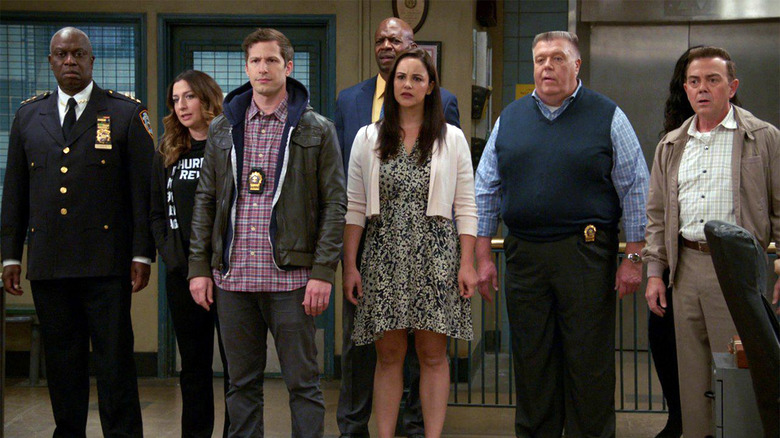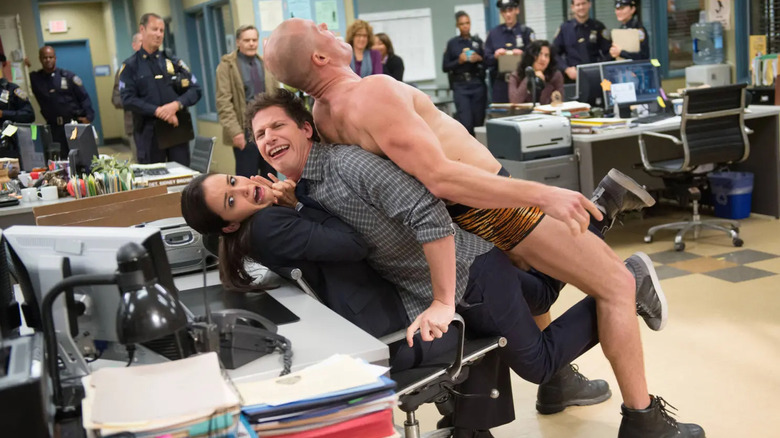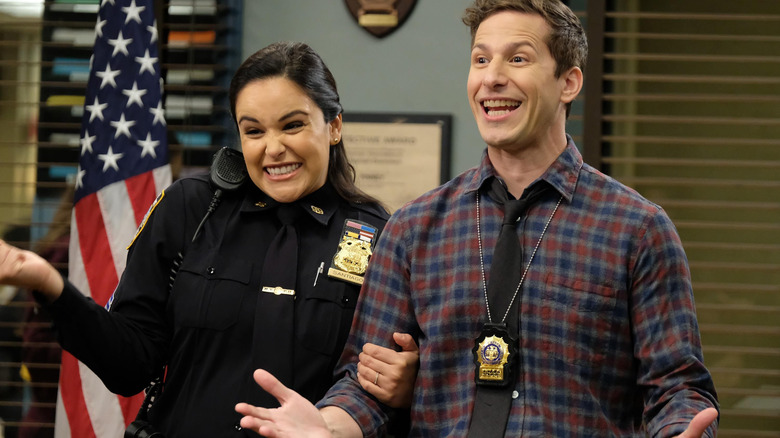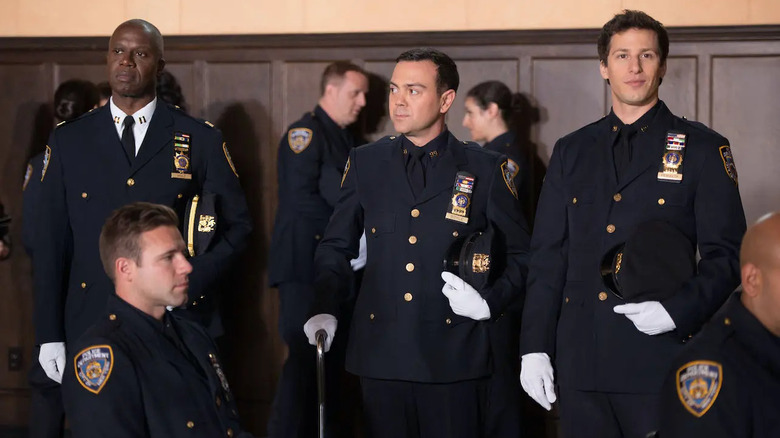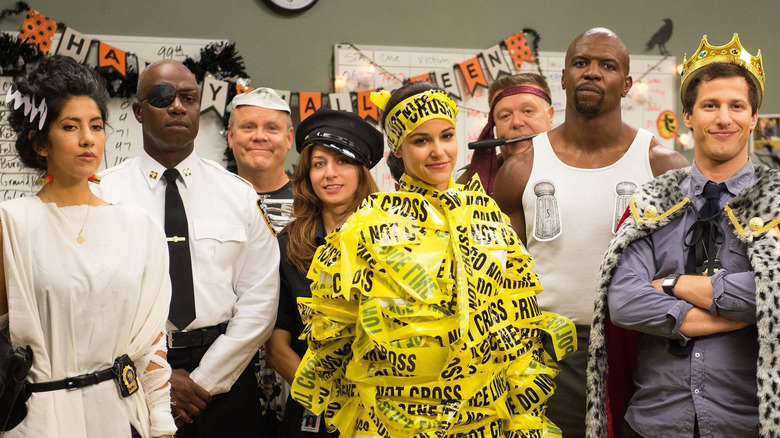Why It Was Time For Brooklyn Nine-Nine To End
When "Brooklyn Nine-Nine" premiered in 2013, it had the recipe for success. The very lovable and effortlessly goofy Andy Samberg was at the helm, foiled by the deadpan comedic genius of Andre Braugher; the show followed a group of co-workers bonding, getting up to some hilariously contrived hijinks, and forming the kind of chosen family that only emerges from the best workplace sitcoms — the ones that are hardest to let go of because of their immeasurable rewatch value and heartwarming, joyful vibes.
Although it had a bumpy road when it came to getting off the ground and securing consistent viewership, by the time "Brooklyn Nine-Nine" hit its fourth season, the series had a dedicated fanbase. When the show was canned by Fox in 2018, outcry was loud enough to see it resurrected a year later on NBC (a trend that's become dangerously popular). But with so much more room to thrive, why did the show end its run after just three years on a new network? It's not that anything about "Brooklyn Nine-Nine" changed before its end — other than being allowed to drop some bleeped swear words, the show was entirely the same when it hit NBC. But between its seventh and eighth season, the context around the series shifted drastically — because the crucial detail I've neglected to mention thus far is that all of the good-natured kindness, found family, and the grand acts of heroism in the series took place in a New York City Police Department precinct.
The underdogs of the NYPD
For so much of its run, "Brooklyn Nine-Nine" felt completely and utterly groundbreaking. It was diverse! The characters were unabashedly liberal! It never shied away from the idea that the police system is flawed! Episodes were responding to movements ranging from Me Too to Black Lives Matter! And all this from a mainstream sitcom that once aired on Fox.
Never blind to the elephant-sized police badge in the room, the series took care to address the systemic issues within the NYPD: Holt frequently grapples with the challenges of being a Black gay man in the force; in Amy Santiago and Rosa Diaz, we get the struggles of being Latina women in the police department; plus, discrimination and corruption are frequent obstacles the 99 must overcome. One season 4 episode revolves around Terry getting racially profiled and hassled by a cop who only relents upon learning that he's a fellow officer. Knowing he'll be penalized by the system, Terry still files a complaint. While this tackles racial profiling head-on, it still does so from the perspective of the 99 — the underdog cops that the show heralds as the "good ones."
The 'good cop' routine comes to an end
Addressing corruption and discrimination doesn't solve the fundamental problem with "Brooklyn Nine-Nine": the show is built around the idea of "good cops" and "good people" in the system being enough to keep things light and kind and okay. Its main character, Samberg's Jake Peralta, is an immature, free-spirited detective with a tendency to jump the gun, ignore procedure and follow his own instincts — a track record that has a little too much in common with the excuses used by real-life rogue officers. But it's played for laughs in the 99: Jake is unconventional and occasionally has to learn a big lesson about his tactics, but for the most part, his wild thinking saves the day. It was always too good to be true, especially in 2020.
Calls for racial justice were amplified mid-pandemic, in the wake of George Floyd's murder by Minneapolis police — and it was no longer something that TV could brush aside with extra kind cops, no matter how diverse the cast. After 32 seasons, "Cops" was (briefly) canceled, well-known procedurals were slinking into the background and even "Paw Patrol" was taking a hit. The "defund Paw Patrol" bits were as serious as they were joking — publicizing police brutality means addressing the media's portrayal of cops, cartoon dogs included. It wasn't a conversation that "Brooklyn Nine-Nine" could avoid. Although the show has always been about the people beneath the uniforms, the audience could no longer look past the bold NYPD label.
B99 has no place in the Defund The Police era
Ignoring the anti-police sentiment and continuing business as usual was never on the table for "Brooklyn Nine-Nine." Doing that would've gone against the show's core beliefs and more importantly, those of its audience. Being unapologetically liberal meant attracting viewers with a similar mindset; unlike "copaganda" leaning shows like "Law and Order" and "Blue Bloods," "Brooklyn Nine-Nine" continuing to paint its cops as heroes would've alienated the fanbase. So something had to change. In response to the 2020 protests, show-runner Dan Goor had the first four episodes of the already in-progress eighth season scrapped, and the team started over. This would be the final season of "Brooklyn Nine-Nine," a fitting choice given how difficult its future already seemed. Crews broke the news when he said:
"We've had a lot of somber talks about it and deep conversations and we hope through this we're going to make something that will be truly groundbreaking this year. We have an opportunity and we plan to use it in the best way possible. Our show-runner Dan Goor, they had four episodes all ready to go and they just threw them in the trash. We have to start over. Right now we don't know which direction it's going to go in."
A show out of time
Season 8 had to walk a very difficult line: use its power responsibly but believably; be funny but not flippant; stay the same but drastically change. So a couple of things happened: Rosa quit the force, Jake faced the consequences of being a semi-rogue cop, and also, the Nine-Nine spent a lot more time out of uniform. "Brooklyn Nine-Nine" was still trying to hold itself up on idealism while poking holes in its own optimistic outlook. At times, it almost felt obligatory — like the show was checking off boxes of sentiments to acknowledge and ideas to proclaim. The execution was shaky, but what was the alternative? In the lead-up to the final season, folks joked that the entire 99 crew should simply quit their jobs and work together somewhere else. After all, the heart of this show is a workplace comedy; it's always been about the people, not the place ... but is that actually true?
Jake Peralta, Amy Santiago, and Raymond Holt, among many others, can't simply be divorced from their uniforms. It's a core part of who they are and how we've come to know them. Seven seasons' worth of character growth went down in that precinct for a reason. But how can the show hold onto all of that while cries to defund the police get louder and louder? How can we watch Jake goof around without anxiously eyeing his holster? How can Amy stay lovable in her sergeant uniform? How could the show possibly keep peddling the "good cops" narrative without edging too close to our bleak reality? The 99 is a police precinct that could only exist in fiction and by 2020, that reality was too painful to keep at a distance.
